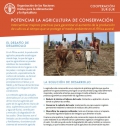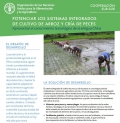Success stories

22 Sep 2015
En el África austral, la producción agrícola a pequeña escala sigue siendo baja, lo que da lugar a que los agricultores no puedan satisfacer las necesidades alimentarias de los hogares ni de los países. Los bajos niveles de producción, especialmente de cultivos de cereales, se derivan principalmente de tasas de precipitaciones erráticas y no fiables y del fracaso de las técnicas agrícolas en la mitigación de tales condiciones. Los métodos agrícolas actuales, dominados por un uso ineficiente de los recursos agrícolas por parte de los agricultores (mano de obra, suplementos para el suelo y agua de lluvia), contribuyen a menudo...
12 May 2015
La producción y la productividad agrícola en el África subsahariana siguen siendo considerablemente inferiores a la media mundial. Es urgentemente necesario abordar el déficit de producción y mejorar la capacidad de adaptación de los territorios agrícolas en dicho continente, teniendo en cuenta el rápido crecimiento demográfico y el cambio climático. El interés por incrementar de forma sostenible la productividad del cultivo de arroz y la acuicultura en todo el continente es hoy más alto que nunca. 
18 Feb 2015
No one feels the effects of climate change quite like farmers. In Mongolia, the growing season lasts for just 90 days and weather conditions have grown increasingly unpredictable, affecting crop production and, in turn, dietary diversity and nutrition. Malnutrition is high and diets are highly imbalanced.
27 Nov 2014
The SSC programme started during the Obasanjo regime, with the signature of the first Tripartite Agreement between Nigeria, China and FAO in February 2003 to launch e the first phase of the programme. The Government of Nigeria has been proactive in soliciting and coordinating exchange of knowledge through SSC and has allocated a total of USD 42.0 million from its own budget in support of the programme implementation.
17 Sep 2014
Aquaculture production in sub-Saharan Africa remains low with a per capita consumption of 9.1 kg/year. The potential is unexploited, and countries such as the Republic of Namibia, which has one of the most productive fishing grounds in the world, also has great potential for freshwater aquaculture development due to its favorable weather conditions. However, there is a lack of high-quality fish seed and feed available, as well as limited technical capacity in the aquaculture industry. This project is finding innovative ways to produce fish in remote areas. Farmed fish can provide additional income and could guarantee a steady supply to...